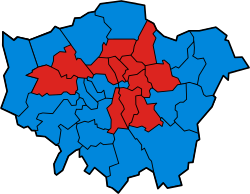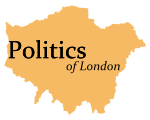
Back Élections municipales de 2008 à Londres French Pemilihan umum Wali Kota London 2008 ID Alegeri pentru Primăria Londrei, 2008 Romanian Выборы мэра Лондона (2008) Russian 2008 London mayoral election SIMPLE Borgmästarvalet i London 2008 Swedish
| |||||||||||||||||||||||||||||||||||||
| Turnout | 45.3% | ||||||||||||||||||||||||||||||||||||
|---|---|---|---|---|---|---|---|---|---|---|---|---|---|---|---|---|---|---|---|---|---|---|---|---|---|---|---|---|---|---|---|---|---|---|---|---|---|
| |||||||||||||||||||||||||||||||||||||
 First preference votes by London borough. Blue boroughs are those with most first preference votes for Boris Johnson and red those for Ken Livingstone | |||||||||||||||||||||||||||||||||||||
| |||||||||||||||||||||||||||||||||||||
| This article is part of a series within the Politics of England on the |
| Politics of London |
|---|
 |
The 2008 London mayoral election for the office of Mayor of London, England, was held on 1 May 2008. Conservative candidate Boris Johnson defeated incumbent Labour Mayor Ken Livingstone.[1] It was the third London mayoral election, the previous elections being the first election in May 2000 and the second election in June 2004.
Johnson became the second Mayor of London and the first Conservative to hold the office since its creation in 2000. This became the first London Mayoral election in which the incumbent mayor was defeated by a challenger. The popular vote achieved by Johnson remained the largest polled by winning mayoral candidate until Labour candidate Sadiq Khan received 1,148,716 first-preference votes in 2016.[2] The result was the first time that the Conservatives had won control of London-wide government since 1977.[3]
- ^ "Johnson Wins London Mayor Race in Body Blow to Brown". Bloomberg.com. 3 May 2008. Retrieved 19 April 2010.
- ^ "Archived copy" (PDF). Archived from the original (PDF) on 9 May 2016. Retrieved 9 May 2016.
{{cite web}}: CS1 maint: archived copy as title (link) - ^ "BBC - Today programme - Boris and Horace".


